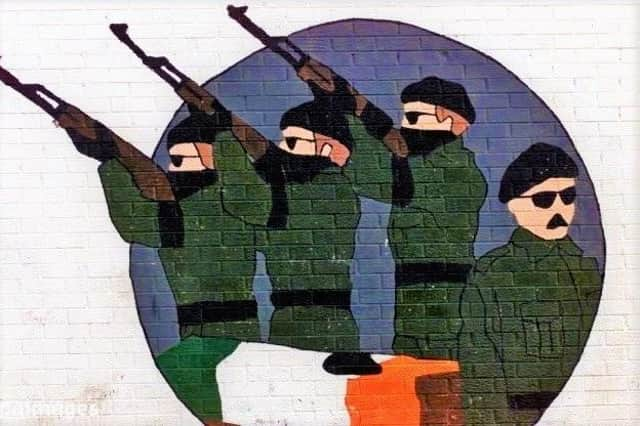Owen Polley: We want no part of Irish nationalism’s ‘Up the Ra’ culture


This composition, which features the repeated refrain, “ooh ah, up the ‘Ra”, in blatant reference to the IRA, was once associated with unreconstructed republican shebeens, or the annual concert at Falls Park that concludes the West Belfast Festival.
Increasingly, though, mainstream Irish nationalist society on both sides of the border seems to have embraced this celebration of terror. It is no longer the preserve of a feral republican sub-culture that has become ever more normalised north of the border.
Advertisement
Hide AdAdvertisement
Hide AdEven so, you would not have expected it to gain its latest airing at the Royal Dublin Showgrounds, in the aftermath of a Leinster rugby game.
This, after all, was the home of the ‘Dublin 4’ set, who traditionally looked down their noses at uncouth outbursts of republicanism. Leinster rugby supporters were more likely to be accused by northern nationalists of harbouring middle-class ‘west Brit’ sympathies, than derided by unionists for praising the provos.
They were the southerners standing ‘shoulder to shoulder’ with unionist Ulstermen, in their enthusiasm for ‘foreign games’.
It’s an indictment of the way that the IRA’s reputation has been sanitised in the south, through the success of Sinn Fein and the ratcheting up of anti-British sentiment in the wake of Brexit, that this song was played at a Leinster rugby match. Setting aside the sneering cliches that northern nationalists traditionally levelled at the polite Dublin rugby crowd, you would have expected more decency and class in their redoubt.
Advertisement
Hide AdAdvertisement
Hide AdUnfortunately, this was not an aberration, but another sign of the way that latent anglophobia has been reactivated in the Republic of Ireland.
It’s not just that a new generation feels entitled to vote for Sinn Fein, despite its inseparability from the IRA, the continued taint of criminality and its refusal to condemn murders both recent and historical. The Republic’s intellectual elite, including influential figures like the Irish Times’ columnist Fintan O’Toole, has attempted to explain that disgraceful development away with reference to everything from the housing crisis to the financial crash.
The success of the Shinners has coincided with a retrospective endorsement of the campaign of murder and bombing that the IRA pursued to try to dislodge Northern Ireland from the United Kingdom. In recent surveys, almost 40 per cent of respondents in the south indicated that they would vote for Sinn Fein.
Unionists were shocked when 70 per cent of northern nationalists endorsed Michelle O’Neill’s claim that the IRA’s campaign was ‘necessary’, but the party’s support in a state that we’re repeatedly told is a progressive, highly functional democracy is perhaps even more damning.
Advertisement
Hide AdAdvertisement
Hide AdThe paradox is that, on many occasions, the newly returned Taoiseach, Leo Varadkar, and his predecessor, Micheal Martin, were prepared to speak about Sinn Fein with a degree of contempt, sarcasm and candour that few modern unionist politicians would risk emulating. Mr Varadkar, for example, described the English recluse who donated £3 million to the party, in murky circumstances, as a ‘vagabond who lived in a caravan’. That was a fantastic, cutting line.
At the same time, Varadkar and his side-kick, Simon Coveney, were prepared to exploit anti-British sentiment during the Brexit negotiations, in an attempt to burnish their credentials among voters in the Republic. They dropped into Northern Ireland without formality, used language that implied that their authority extended to this part of the island and introduced provocative legislation designed to extend the right to vote in Irish presidential elections to this part of the UK.
Most of all, they encouraged the idea that new border controls after Brexit must fall between Great Britain and Northern Ireland, rather than at the existing international frontier where they properly belonged, because infrastructure on the island of Ireland was a provocation likely to incite violence. They provided a justification, in other words, for exactly the kind of terrorism that, in other contexts, they condemned so vigorously. And they used implicit threats as a political lever to drive a wedge between this province and the rest of the UK.
The anti-British mood in the Republic that followed Brexit, as well as the casual, pro-IRA culture that accompanied it, was the responsibility of mainstream figures like Varadkar, and Coveney, as well as overt republicans in Sinn Fein. But it is not solely the fault of politicians either, because they were only tapping into deeply embedded prejudices that have been part of the Irish separatist state since its inception.
Advertisement
Hide AdAdvertisement
Hide AdFor unionists, the consolation is that, so long as pro-terror voices gain acceptance in the Republic and cultural references to the IRA are increasingly overt, an all-Ireland state will become less attractive to persuadable voters. It is particularly likely to repel the complacent liberal centre-ground, which was previously thought to be soft-unionist, but was alienated by Brexit and drawn to some of the ‘progressive’ claptrap that has become so fashionable in the south.
Irish separatism remains the same creature, whatever new skin it dons to sell itself to a new generation. The kind of behaviour that was considered extreme, repulsive and plain primitive in the 80s and the 90s is now mainstream; it’s cool and it is scarcely bothering to disguise itself with a veneer of irony.
We want no part of it. Not now, not ever.